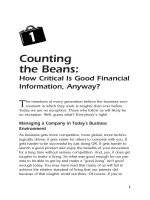Finance for non financial managers
Bạn đang xem bản rút gọn của tài liệu. Xem và tải ngay bản đầy đủ của tài liệu tại đây (144.17 KB, 11 trang )
T
he members of every generation believe the business envi-
ronment in which they work is tougher than ever before.
Today we are no exception. Those who follow us will likely be
no exception. Well, guess what? Everybody’s right!
Managing a Company in Today’s Business
Environment
As business gets more competitive, more global, more techno-
logically driven, it gets easier for others to compete with you. It
gets harder to be successful by just doing OK. It gets harder to
launch a good product and enjoy the benefits of your innovation
for a long time without serious competition. And, yes, it does get
tougher to make a living. So what was good enough for our par-
ents to be able to get by and make a “good living” isn’t good
enough today. You may have read that many of us will fail to
achieve the relative standard of living that our parents did
because of that tougher world out there. Of course, if you’ve
1
Counting
the Beans:
How Critical Is Good Financial
Information, Anyway?
1
been alive for the past 10 or 15 years, you also know that there
are unprecedented opportunities to create new wealth, new
products, new companies, and new fortunes that never before
existed. It’s unlikely that our forefathers could have imagined for-
tunes being made, and lost, as quickly as they were in the ’90s.
So it’s hard to argue that times are more challenging now.
The question is: what can you do about it? The answer: not
much about the times, but a lot about how you prepare for
them. And that’s what this book is all about.
When I was a young boy, my father owned and ran a small
grocery store that supplied the neighbors with their daily house-
hold needs, long before supermarkets killed the mom-and-pops
that then existed in every neighborhood. When school was over,
I went to the store to help out, because mom and dad were both
working there. My first job was opening cases of packaged
goods, pricing the packages, and stocking the shelves. Then I
packed groceries and delivered them to customers, sometimes
after taking their order over the phone and personally filling it.
(Yes, that was how many small stores did business back then.)
Then I graduated to cutting meat in the fresh meat department.
By the time I was in junior high school, I was checking out cus-
tomers, opening the store in the morning, and finally running
the store when my parents went on a rare vacation. By the time
I was in high school, I had run every aspect of a small business,
including opening and closing the cash register and doing the
bookkeeping at the end of the day.
In today’s business terms, I had worked in shipping/receiv-
ing, warehousing and inventory control, production, sales, deliv-
ery, billing and collection, accounting, and management.
Uncommon today? Yes, and yet that diverse background is
exactly what is being demanded more and more of today’s up-
and-coming professionals. Managers in companies large and
small, including directors, vice presidents, and general man-
agers, are finding their particular specialties aren’t going to
carry them to the finish line as they might once have.
Their first clue might have been the arrival of the personal
Finance for Non-Financial Managers2
computer. Senior managers and company executives a genera-
tion ago were challenged by their lack of knowledge of this new
tool, no matter how firmly they knew their own particular areas
of expertise. The young professionals coming into the business
often made their bosses look old-fashioned with their mastery of
this impressive and intimidating technology. Soon, as we discov-
ered, those young professionals had children, whose computer
acumen after being on the planet for only a few years made
even their savvy parents sit up and take notice. And so it goes.
Now, as we are learning, finance and accounting are having
an impact on many companies in ways never before thought of
by managers outside the financial department. The accounting
scandals of 2002 showed that financial incompetence, or care-
lessness, or simply lack of integrity, could wipe out the efforts of
thousands of loyal, hard-working employees. The report card, it
seems, has become more important than it ever was when we
were in school.
Today we’re finding out that we need to know how to read a
report card so we can just keep our jobs, let alone advance in our
careers. Boards of directors now need to delve into the reports
they have routinely received for years to a degree never before
contemplated. They need to understand financial terminology and
accounting methods they might previously have taken for grant-
ed. CEOs now need to be completely aware of what their people
are doing and the financial ramifications, because they will no
longer be able to credibly say they didn’t know. And finally, man-
agers within a company, whether large or small, are going to
need to understand the rules of accounting and the boundaries of
proper finance well enough to avoid getting into trouble just
because they were aggressively trying to make their goals. As for
those who aspire to become managers, they might not even get
started up the ladder until they can demonstrate this kind of
knowledge. So you see, it touches everyone.
Now, it’s all well and good to say that accounting scandals
will make everyone learn more about finance and accounting,
but is that the only reason to know this stuff? Of course not!
Counting the Beans 3
Consider the new manager
who is asked to prepare a
budget for his or her
department.
How do you begin your
budget? Well, how about
sales? Do you start with
what you hope you can
sell? What you’re sure you
can sell? What you sold
last year or last month?
What will management believe?
OK, if that’s too confusing, maybe you should start with
expenses. What do you need to spend? What you spent last
year or last month? What you hope you can get approval to
spend? Do you actually know what it will really cost?
Just knowing where to begin is a challenge. And then how
do you decide how much money or staffing you’ll need to reach
the goals you want to achieve or that your boss wants you to
achieve?
Whew! Why can’t Finance just do this for you?
And the truth is, of course, they really can’t. Oh, sure,
Finance can prepare something that looks like a budget and in
many companies that’s what happens. But then it’s not really
your budget; it’s theirs. And if you miss the target they set, well,
it’s not really your problem, now, is it? Yet as managers we
know that each department knows its unique needs and capa-
bilities better than anyone else. And we know from Management
101 that a goal must be accepted—better yet, owned—by the
people who actually will do the work, for there to be a strong
commitment to achieving it. And that, simply put, is why each
department within the organization must do its own budget and,
therefore, why its managers must learn to budget effectively.
And, yes, you will need to be able to answer, at some level, all
the questions I’ve raised above. Happily, Chapter 10 in this
book will help you do that.
Finance for Non-Financial Managers4
Budget A projection of
the detailed income and
expenses that we estimate
will occur in a future period, usually
prepared on a month-to-month basis
for up to a year. Each kind of income
and expense is listed, along with the
amount each line is expected to add
to or subtract from the profit for the
period.
The Role of the Finance Department
The Finance Department really has two fairly distinct jobs to
perform in most companies: managing the company’s financial
resources (“Finance”) and recording and reporting all its finan-
cial transactions (“Accounting”). Many of today’s mid-sized and
smaller companies don’t establish separate Finance and
Accounting departments within their organizations. A company
might instead have a chief financial officer who per-
forms or oversees the
finance functions for the
company and oversees the
company’s accounting
activities. Larger compa-
nies will usually be fairly
precise about their organi-
zation and are likely to
have distinctly separate
departments reporting to
the CFO.
Finance
The Finance Department can be an accumulation of diverse
functions, depending on the company. It may oversee such
areas as insurance and risk management, contract administra-
tion and pricing, internal auditing, investor relations, and more.
But at a minimum, Finance will likely be responsible for treas-
ury activities, often under an executive carrying the title of
treasurer or vice president for finance. His or her role will likely
include cash management, bank relations, investments, and
everything having to do with making sure the organization has
enough cash to do its job and has all its cash busily working or
productively invested.
Major activities like mergers and acquisitions, attracting
investors to a company seeking outside capital, and internal
management of public stock offerings—all traditional roles of
Finance—will usually fall within the Finance Department’s
Counting the Beans 5
Chief financial officer
(CFO) The job title of the
executive who is in overall
charge of all the financial department
activities in all large companies and
most mid-sized ones. Smaller compa-
nies might instead place their financial
department under a vice president
for finance or even a controller,
depending on how they define the
responsibilities of these people.









